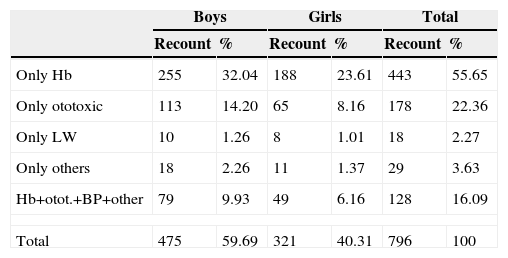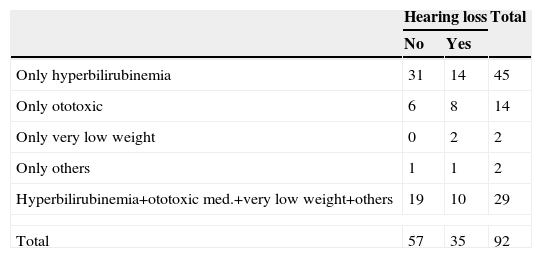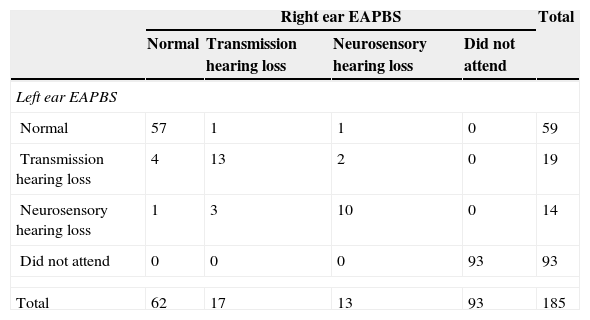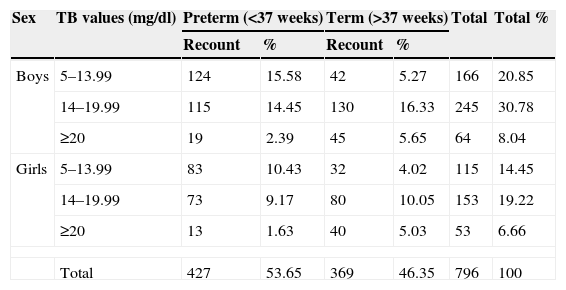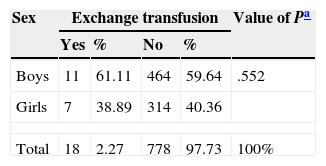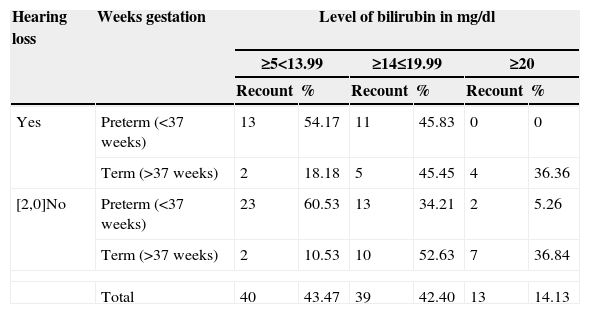Severe jaundice that requires exchange transfusion has become a relatively rare situation today. About 60% of full term neonates and 80% of premature ones will suffer from jaundice within the first week of life.
Hyperbilirubinemia at birth is a risk factor associated with hearing loss that is usually further linked to other factors that might have an effect on hearing synergistically. This study aimed to identify the relationship between hyperbilirubinemia at birth as a risk factor for sensorineural hearing loss in children born at Complejo Hospitalario Universitario Insular Materno-Infantil de Gran Canaria, in the 2007–2011 period.
MethodThis was a retrospective study of 796 newborns that had hyperbilirubinemia at birth, using transient evoked otoacoustic emissions and evoked auditory brainstem response.
ResultsHundred eighty-five newborns (23.24%) were referred for evoked auditory brainstem response. Hearing loss was diagnosed for 35 (4.39%): 18 neonates (51.43%) with conductive hearing loss and 17 (48.57%) with sensorineural hearing loss, 3 of which were diagnosed as bilateral profound hearing loss. Half of the children had other risk factors associated, the most frequent being exposure to ototoxic medications.
ConclusionsThe percentage of children diagnosed with sensorineural hearing loss that suffered hyperbilirubinemia at birth is higher than for the general population. Of those diagnosed, none had levels of indirect bilirubin ≥20mg/dl, only 47% had hyperbilirubinemia at birth as a risk factor and 53% had another auditory risk factor associated.
La ictericia severa que precisa exanguinotransfusión se ha convertido en una situación relativamente rara en la actualidad. El 60% de los neonatos a término y el 80% de los pretérmino se pondrán ictéricos dentro de la primera semana de vida.
La hiperbilirrubinemia al nacer es un factor de riesgo asociado a hipoacusia que generalmente se asocia a otros que podrían tener efecto sobre la audición de manera sinérgica. El objetivo del estudio es establecer la relación entre la hiperbilirrubinemia al nacer como factor de riesgo de hipoacusia neurosensorial en los niños nacidos en el Complejo Hospitalario Universitario Insular Materno-Infantil de Gran Canaria, período 2007–2011.
MétodoEstudio retrospectivo de 796 recién nacidos con hiperbilirrubinemia al nacer, mediante otoemisiones acústicas provocadas transitorias y potenciales evocados auditivos de tronco cerebral.
ResultadosCiento ochenta y cinco recién nacidos (23,24%) fueron derivados a potenciales evocados auditivos de tronco cerebral. Treinta y cinco recién nacidos (4,39%) presentaron diagnóstico de hipoacusia, 18 (51,43%) hipoacusias de transmisión, 17 (48,57%) hipoacusias neurosensoriales y de estos 3 con hipoacusia profunda bilateral. La asociación a otro factor de riesgo se presenta en la mitad de los niños estudiados, siendo el más frecuente la exposición a ototóxicos.
ConclusionesEl porcentaje de niños con diagnóstico de hipoacusia neurosensorial entre los recién nacidos con hiperbilirrubinemia al nacer es superior a la esperada en la población general. De los diagnosticados de hipoacusias neurosensoriales ninguno presentó niveles de bilirrubina indirecta en sangre ≥20mg/dl, el 47% tenían solo la hiperbilirrubinemia al nacer como factor de riesgo mientras que el 53% evidenciaba otro factor de riesgo auditivo asociado.






